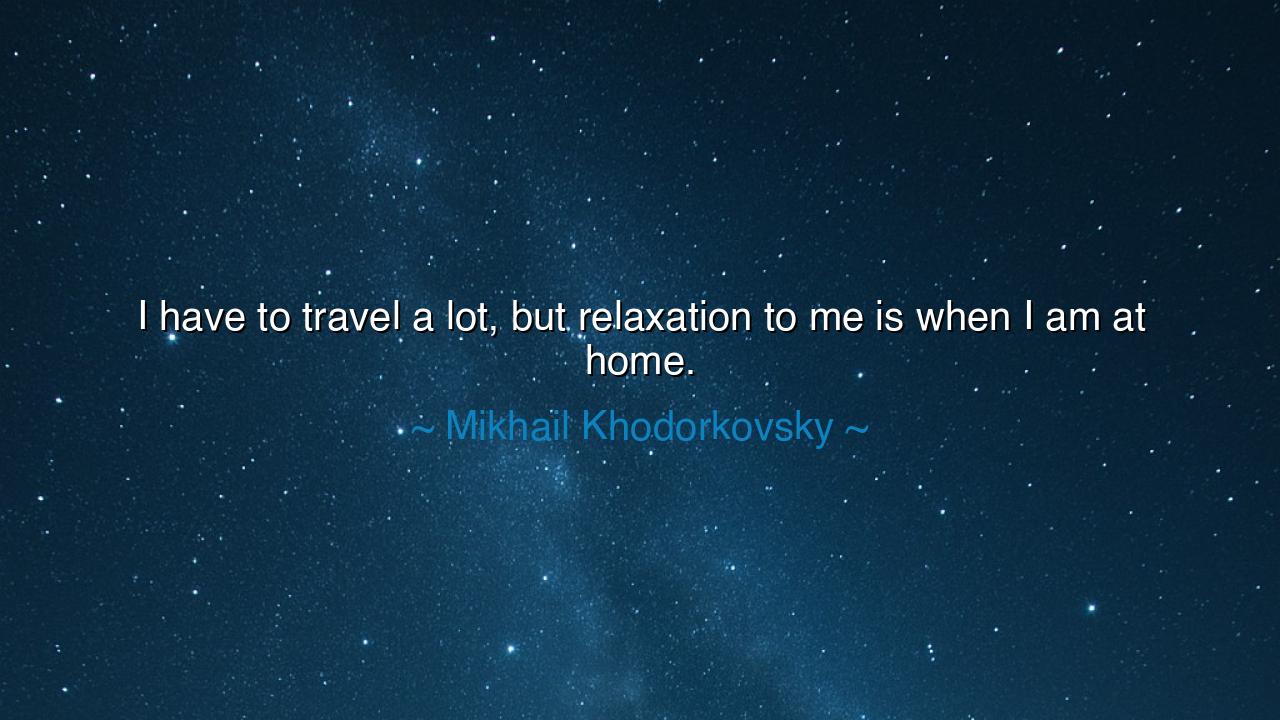
I have to travel a lot, but relaxation to me is when I am at






Mikhail Khodorkovsky, a man who has known both the heights of power and the depths of confinement, once said with quiet simplicity: “I have to travel a lot, but relaxation to me is when I am at home.” Though these words seem ordinary, they carry a weight of human truth. For in them we find the eternal tension between the demands of the outer world and the refuge of the inner one. To travel is to labor, to strive, to be torn from one’s roots. To be at home is to return to rest, to peace, to the stillness where the soul breathes freely again.
The origin of this reflection lies in Khodorkovsky’s own life as a businessman and later as a political dissident in Russia. His career drew him across borders, into boardrooms and conflicts, through courts and prisons. His existence was one of movement, of ceaseless motion—whether chosen or imposed. Yet, in all this, he recognized that true relaxation and restoration were not found in luxury abroad or in fleeting distractions, but in the grounding presence of home. His statement reveals that the soul longs not for constant novelty, but for anchoring, for the familiar hearth where one is fully known.
This wisdom is as old as humanity itself. In the epics of the ancients, heroes often spent years wandering distant lands, yet their hearts always turned back toward home. Odysseus sailed seas and faced monsters, but his greatest desire was not conquest, but return to Ithaca, to Penelope, to the life of quiet and belonging. Khodorkovsky’s words echo this truth: the greatest treasure of the wanderer is not the journey itself, but the haven that awaits when the journey ends.
Consider also the story of Marcus Aurelius, emperor of Rome. He commanded legions, ruled an empire, and traveled across vast frontiers of war. Yet in his private writings, he yearned for simplicity—moments of stillness, the company of loved ones, the discipline of the inner life. He knew, as Khodorkovsky would later express, that power and travel may shape the world, but only home restores the heart.
The lesson here is that ceaseless striving without renewal leads to emptiness. The world may call us outward into motion, into work, into travel and responsibility. But if we do not balance this with moments of return, with stillness and rest, we risk becoming exiles even in our own lives. True relaxation is not escape, but rootedness; not indulgence, but presence. It is the soul finding harmony again amidst the storms of duty.
Practically, this means cherishing the sanctity of home—whether it be a place, a family, a community, or simply the quiet within oneself. Create a space that restores you, and guard it fiercely against the constant demands of the world. When you travel, remember that the journey has meaning only when it deepens your love for where you belong. When you labor, remember to return not just to a house, but to a home where the heart can rest.
Thus, Khodorkovsky’s words, though simple, shine with ancient truth: “I have to travel a lot, but relaxation to me is when I am at home.” They remind us that the greatest journeys are crowned not by distant lands, but by return; not by applause, but by rest. Let us then strive outward when duty calls, but never forget to return inward, to the hearth where peace lives. For only in this balance does the soul endure, and only in this rhythm of departure and return do we truly live whole lives.






AAdministratorAdministrator
Welcome, honored guests. Please leave a comment, we will respond soon